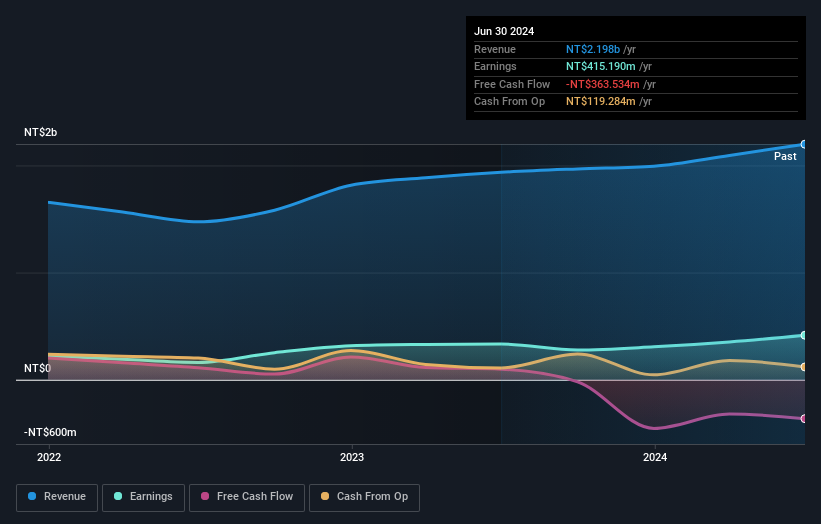- Taiwan
- /
- Semiconductors
- /
- TWSE:6937
Skytech Inc.'s (TWSE:6937) largest shareholders are individual investors who were rewarded as market cap surged NT$2.8b last week

Key Insights
- Significant control over Skytech by individual investors implies that the general public has more power to influence management and governance-related decisions
- A total of 10 investors have a majority stake in the company with 52% ownership
- Insider ownership in Skytech is 19%
To get a sense of who is truly in control of Skytech Inc. (TWSE:6937), it is important to understand the ownership structure of the business. And the group that holds the biggest piece of the pie are individual investors with 43% ownership. Put another way, the group faces the maximum upside potential (or downside risk).
Clearly, individual investors benefitted the most after the company's market cap rose by NT$2.8b last week.
In the chart below, we zoom in on the different ownership groups of Skytech.
View our latest analysis for Skytech

What Does The Lack Of Institutional Ownership Tell Us About Skytech?
We don't tend to see institutional investors holding stock of companies that are very risky, thinly traded, or very small. Though we do sometimes see large companies without institutions on the register, it's not particularly common.
There are multiple explanations for why institutions don't own a stock. The most common is that the company is too small relative to funds under management, so the institution does not bother to look closely at the company. It is also possible that fund managers don't own the stock because they aren't convinced it will perform well. Skytech might not have the sort of past performance institutions are looking for, or perhaps they simply have not studied the business closely.

Skytech is not owned by hedge funds. Zhaofu International Investment Co., Ltd. is currently the company's largest shareholder with 6.9% of shares outstanding. Haifu International Investment Co., Ltd. is the second largest shareholder owning 6.3% of common stock, and Biaofu International Investment Co., Ltd. holds about 5.9% of the company stock. Furthermore, CEO George Yi is the owner of 2.1% of the company's shares.
We did some more digging and found that 10 of the top shareholders account for roughly 52% of the register, implying that along with larger shareholders, there are a few smaller shareholders, thereby balancing out each others interests somewhat.
While it makes sense to study institutional ownership data for a company, it also makes sense to study analyst sentiments to know which way the wind is blowing. As far as we can tell there isn't analyst coverage of the company, so it is probably flying under the radar.
Insider Ownership Of Skytech
While the precise definition of an insider can be subjective, almost everyone considers board members to be insiders. Management ultimately answers to the board. However, it is not uncommon for managers to be executive board members, especially if they are a founder or the CEO.
I generally consider insider ownership to be a good thing. However, on some occasions it makes it more difficult for other shareholders to hold the board accountable for decisions.
It seems insiders own a significant proportion of Skytech Inc.. It has a market capitalization of just NT$20b, and insiders have NT$3.8b worth of shares in their own names. It is great to see insiders so invested in the business. It might be worth checking if those insiders have been buying recently.
General Public Ownership
The general public-- including retail investors -- own 43% stake in the company, and hence can't easily be ignored. This size of ownership, while considerable, may not be enough to change company policy if the decision is not in sync with other large shareholders.
Private Company Ownership
It seems that Private Companies own 38%, of the Skytech stock. Private companies may be related parties. Sometimes insiders have an interest in a public company through a holding in a private company, rather than in their own capacity as an individual. While it's hard to draw any broad stroke conclusions, it is worth noting as an area for further research.
Next Steps:
I find it very interesting to look at who exactly owns a company. But to truly gain insight, we need to consider other information, too. To that end, you should learn about the 3 warning signs we've spotted with Skytech (including 2 which are significant) .
Of course this may not be the best stock to buy. So take a peek at this free free list of interesting companies.
NB: Figures in this article are calculated using data from the last twelve months, which refer to the 12-month period ending on the last date of the month the financial statement is dated. This may not be consistent with full year annual report figures.
New: Manage All Your Stock Portfolios in One Place
We've created the ultimate portfolio companion for stock investors, and it's free.
• Connect an unlimited number of Portfolios and see your total in one currency
• Be alerted to new Warning Signs or Risks via email or mobile
• Track the Fair Value of your stocks
Have feedback on this article? Concerned about the content? Get in touch with us directly. Alternatively, email editorial-team (at) simplywallst.com.
This article by Simply Wall St is general in nature. We provide commentary based on historical data and analyst forecasts only using an unbiased methodology and our articles are not intended to be financial advice. It does not constitute a recommendation to buy or sell any stock, and does not take account of your objectives, or your financial situation. We aim to bring you long-term focused analysis driven by fundamental data. Note that our analysis may not factor in the latest price-sensitive company announcements or qualitative material. Simply Wall St has no position in any stocks mentioned.
About TWSE:6937
Excellent balance sheet with acceptable track record.

